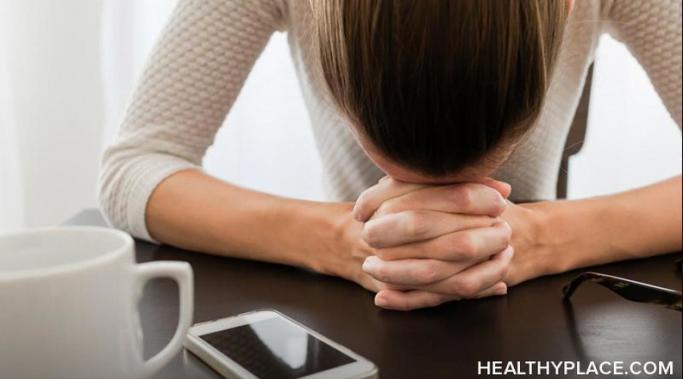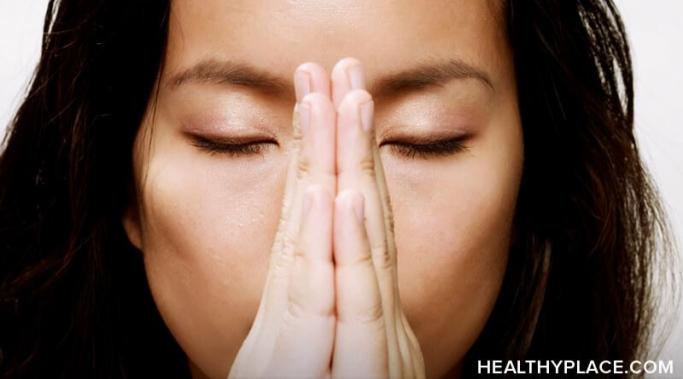Is it possible to distract yourself from fear? Fear is a basic human reaction, an instinct even, to something we perceive as a threat to our safety or general wellbeing. It sounds an alarm in the brain and kicks the fight-or-flight response into gear. When we are afraid, we want to run from what it is that's making us feel scared, or we want to confront it and do battle. Our instinct typically isn't to ignore fear by distracting ourselves with something else. Can you distract yourself from fear? Do you want to?
Anxiety Management – Anxiety Schmanxiety
Feeling full of anxiety is a common experience. Anxiety has a way of infiltrating both brain and body. When we're consumed by anxiety, it becomes difficult to think about anything else, and the emotions and sensations that we pay attention to the most are those that relate to anxiety. Also, anxiety impacts what we do or don't do. Basically, anxiety has a way of taking us over. We become full of anxiety. We can do something about this. If you're tired of being full of anxiety, empty your cup of tea.
I must admit, anxiety-related procrastination plays a part in my life. There are far too many days when I find it very hard to cope with the complicated, impossibly fast push and pull of life. I can feel as though the world is too big and frightening and all I want to do is focus on the tiny acts of nurturing that help me cope minute to minute: nursing a large cup of tea, taking a nap or hiding in the bathroom to get away from the feeling of eyes and supposed scrutiny all around. These things look and feel like procrastination due to my anxiety.
Current events cause anxiety. News and media tell of violence and strife, hate, political problems, and more, and it takes a toll on our mental health. In many cases, these events are geographically distant from viewers and thus aren't an immediate threat to life and wellbeing. Why, then, do we experience news media anxiety? Further, what can we do when current events cause anxiety?
It's possible to reduce anxiety and guilt starting immediately. Last week's post, Guilt: A Distressing Effect of Anxiety, explored guilt as an effect of anxiety and the vicious cycle created when anxiety increases guilt which, in turn, causes greater anxiety and then more guilt. Just because we feel guilty, however, doesn't mean we have to accept it. The following suggestions can help you reduce anxiety and guilt now.
Beating anxiety is an active process that is not unlike participating in a triathlon. To find solution focused help to beat anxiety and live the life you desire takes commitment and dedication to the greater goal of living an anxiety-free life (Stop Avoiding Anxiety! Acceptance and Commitment Therapy (ACT)). For athletes who participate in triathlons, these events really aren’t merely single events. "Triathlon" describes a lifestyle. Similarly, beating anxiety isn’t just an event but instead is a lifestyle. Just as completing a triathlon requires action, so does beating anxiety. The following approach will help you beat anxiety the triathlon way.
Divide and conquer to overcome anxiety. Overcoming anxiety is a common, if not universal, goal among those of us who experience anxiety in any of its forms (Types of Anxiety Disorders: List of Anxiety Disorders). Unfortunately, doing so can be a daunting challenge that eventually begins to seem impossible. Fortunately, overcoming anxiety is not impossible, and it doesn't even have to be daunting. One way to move past anxiety is to divide and conquer; in other words, break anxiety down into manageable bits and reduce it piece by piece with intentional action.
There is a strong correlation between anxiety and awe, or, rather, there's a strong correlation between a sense of awe and a reduced experience of anxiety. This makes perfect sense, as both anxiety and awe involve a specific focus and way of thinking--and each one is the opposite of the other. The relationship between anxiety and awe is fairly simple. The more we seek and create the experience of awe, the lower our anxiety becomes.
If asked what purpose anxiety has in their lives, people's answers might range from "absolutely nothing" to "torturing me and ruining my life." Admittedly, it often feels like anxiety exists for no other reason than to torment us. Further, if we try to find a point to our anxiety, we frequently come up with nothing. Believe it or not, though, anxiety frequently does have a purpose. Discovering it can help you beat anxiety.
What is an anxiety tolerance level? Anxiety can seem like an insurmountable challenge, a life-halting obstacle. It's typical for people living with any anxiety disorder to feel as though they can't tolerate anxiety at all. The idea of having an anxiety tolerance level beyond zero might seem strange, pointless, or both. However, developing a system for rating your tolerance level for your anxiety can be a very helpful tool for managing and overcoming anxiety.








